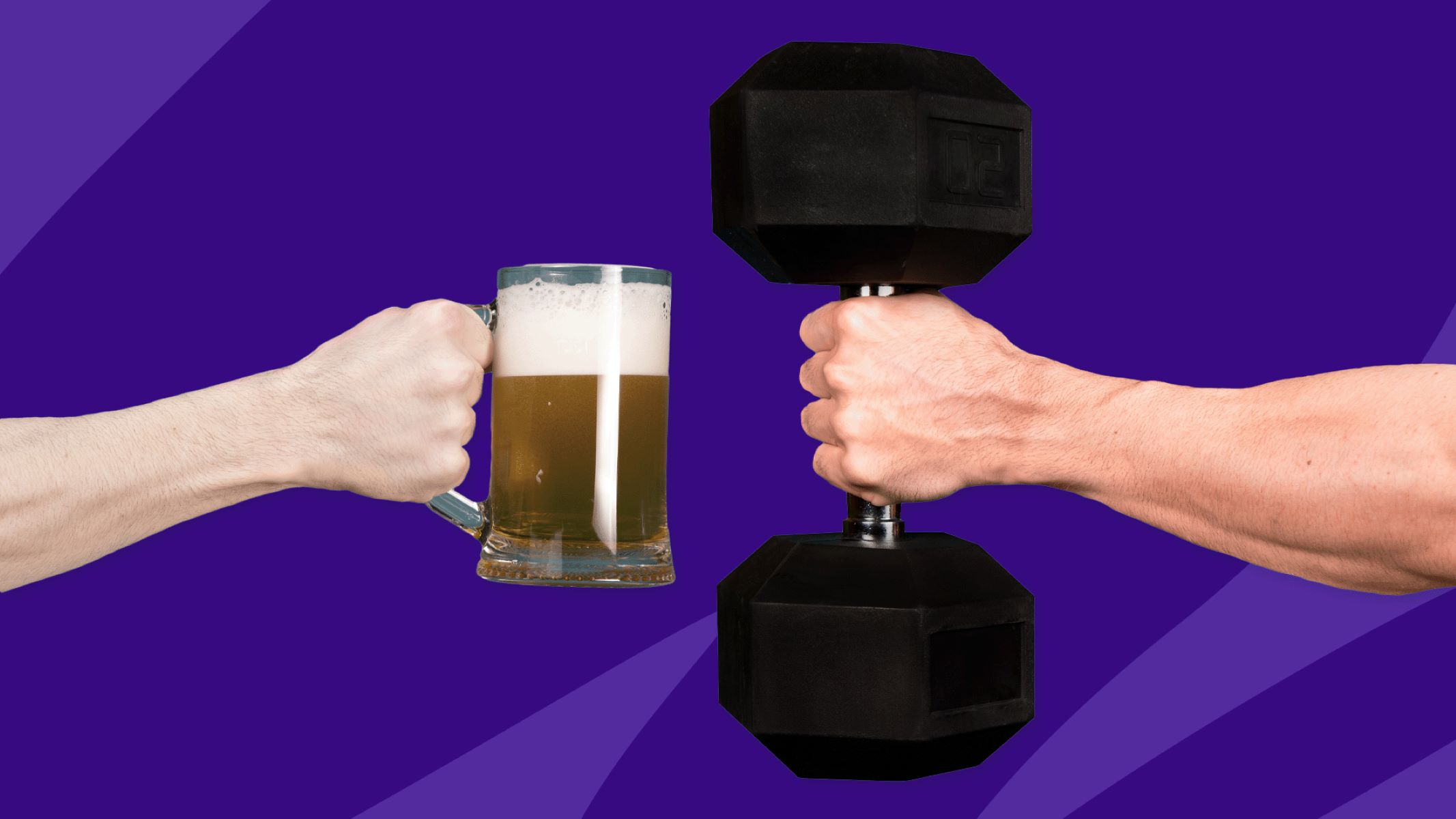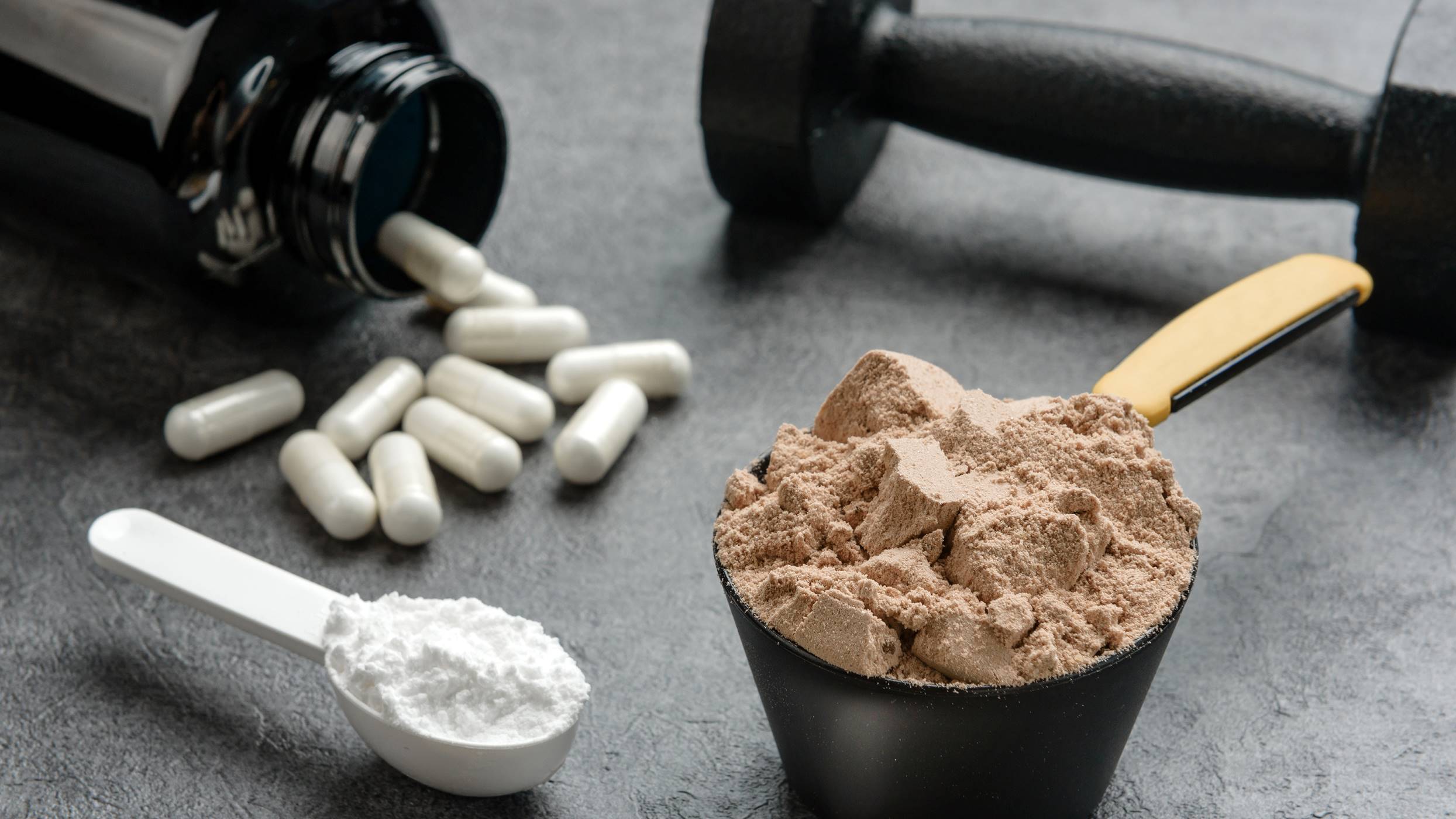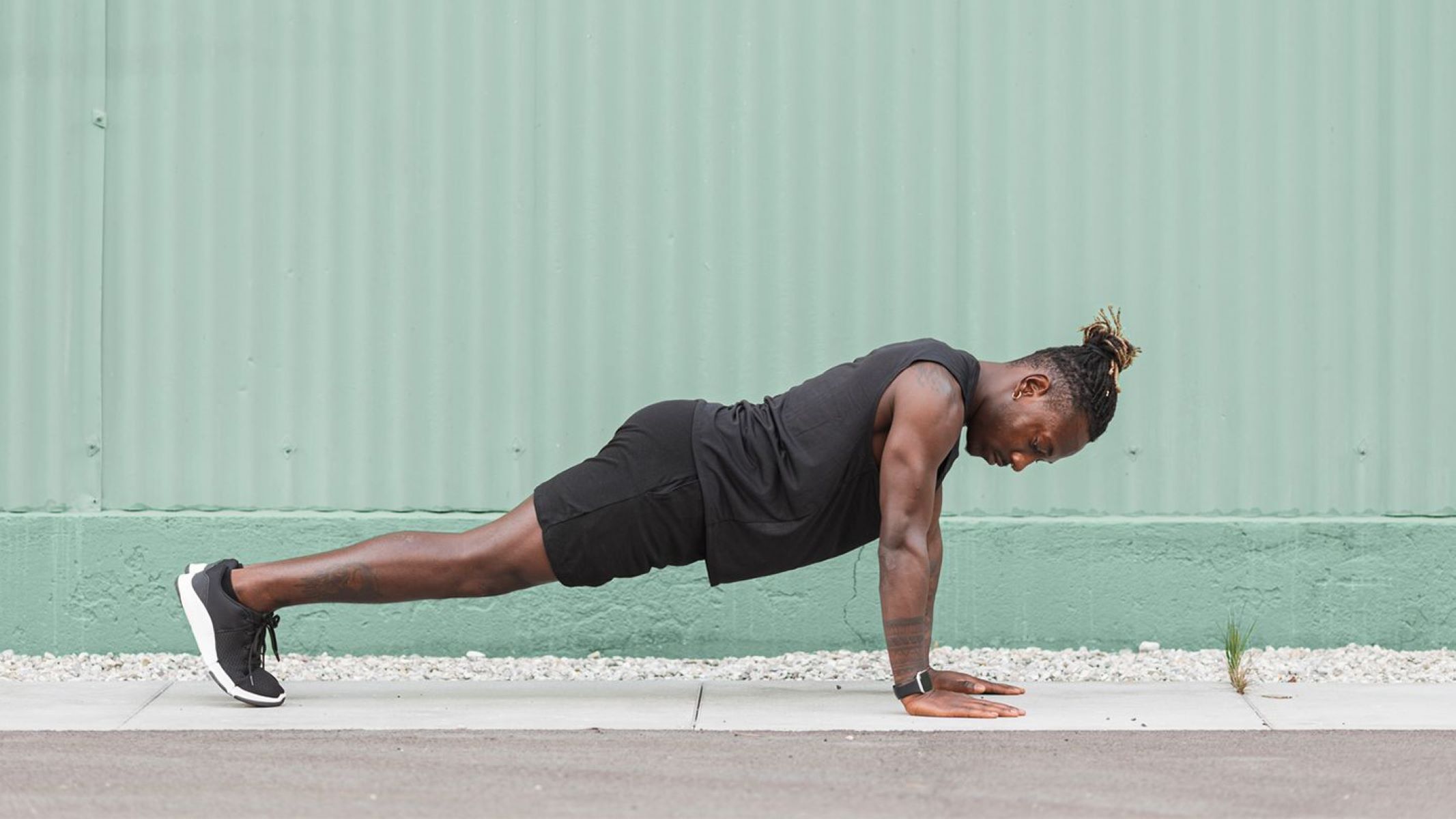Home>Misc>Featured>How Much Does Nutrition Affect Athletic Performance


Featured
How Much Does Nutrition Affect Athletic Performance
Modified: January 2, 2024
Discover how much nutrition truly impacts sporting performance and learn the importance of a well-balanced diet. Uncover the role of featured nutrients in achieving athletic success.
Introduction
Athletes around the world dedicate their lives to training, constantly pushing the boundaries of their physical capabilities. While hard work and talent are undoubtedly crucial to success, it is often an athlete’s nutrition that can make the difference between mere competence and extraordinary performance. Proper nutrition plays a vital role in supporting an athlete’s training, recovery, and overall athletic performance.
The food an athlete consumes serves as fuel for their body, providing the energy and nutrients necessary to perform at their best. A well-balanced and nutrient-dense diet can improve strength, endurance, speed, and agility, allowing athletes to push their limits and excel in their sport.
This article will delve into the critical role that nutrition plays in athletic performance. We will explore the impact of macronutrients, such as carbohydrates, proteins, and fats, as well as the importance of micronutrients, including vitamins and minerals. Additionally, hydration’s crucial role in performance and strategies for optimizing nutrition for athletic endeavors will be discussed. Finally, we will touch on the significance of recovery nutrition and building a personalized nutrition plan for optimal athletic performance.
As an athlete, understanding how nutrition affects your performance can be a game-changer. Whether you are a professional athlete, a weekend warrior, or someone simply looking to improve their fitness, optimizing your nutrition can take your athletic performance to new heights.
The Role of Nutrition in Athletic Performance
Nutrition plays a critical role in athletic performance, as the food an athlete consumes directly impacts their ability to train, recover, and achieve their best results. An athlete’s body requires a specific balance of macronutrients (carbohydrates, proteins, and fats) and micronutrients (vitamins and minerals) to perform optimally.
First and foremost, macronutrients serve as fuel for the body. Carbohydrates, in particular, are the primary energy source during exercise as they are easily converted into glucose. Consuming an adequate amount of carbohydrates provides athletes with the energy needed for endurance, speed, and power. Proteins are crucial for muscle repair and growth, making them essential for athletes looking to build strength and recover properly. Fats, although often misunderstood, play a vital role in providing sustained energy and supporting overall health.
In addition to macronutrients, athletes must pay attention to their micronutrient intake. Vitamins and minerals are involved in numerous physiological processes in the body and are crucial for optimal athletic performance. For example, vitamin C helps boost the immune system, which is essential for athletes who engage in intense training, while iron is necessary for oxygen transport, benefiting endurance athletes.
Furthermore, proper hydration is a vital aspect of nutrition for athletes. Dehydration can lead to decreased performance, fatigue, muscle cramps, and even heat stroke. It is crucial for athletes to maintain proper fluid balance by drinking enough water before, during, and after exercise. Staying hydrated helps optimize cognitive function, thermoregulation, and ensures the efficient delivery of nutrients to the muscles.
Overall, the role of nutrition in athletic performance cannot be underestimated. By providing the body with the right balance of macronutrients, micronutrients, and fluid intake, athletes can enhance their energy levels, improve recovery, and maximize their performance potential. The next section will dive deeper into the impact of specific macronutrients on athletic performance.
Macronutrients and Their Impact on Performance
Macronutrients are the main sources of energy for the body and play a crucial role in athletic performance. Understanding their impact on the body can help athletes optimize their nutrition and achieve their performance goals.
Carbohydrates: Carbohydrates are the primary fuel source for the muscles and the brain. They are broken down into glucose, which provides energy for exercise. Consuming an adequate amount of carbohydrates is essential for athletes, as it can enhance endurance, speed, and power. Carbohydrate-rich foods include whole grains, fruits, vegetables, and legumes. Pre-workout meals or snacks should be focused on carbohydrates to provide readily available energy.
Proteins: Proteins are crucial for muscle repair, recovery, and growth. During intense exercise, muscle proteins break down, and consuming adequate protein helps promote their repair and synthesis. Protein-rich foods include lean meats, poultry, fish, dairy products, eggs, beans, and legumes. Athletes, especially those engaging in strength training, should ensure they consume enough protein to support their muscle development and recovery.
Fats: Fats are an important source of energy, particularly for endurance athletes. They provide a concentrated form of calorie fuel and are useful for long-duration activities. However, it is essential to focus on consuming healthy fats, such as avocados, nuts, seeds, and fatty fish. These fats contain omega-3 and omega-6 fatty acids, which have anti-inflammatory properties and contribute to overall health.
In addition to providing energy, these macronutrients also serve other important functions. Carbohydrates, for example, can help with glycogen storage in the muscles and liver, which is necessary to sustain prolonged exercise. Proteins aid in muscle recovery and repair, preventing muscle breakdown and promoting growth. Fats contribute to hormone production, insulation, and nutrient absorption. Striking the right balance of macronutrients is crucial for athletes to optimize their performance and support their overall health.
It is worth noting that individual athletes may require different ratios of macronutrients based on their sport, activity level, and specific goals. Consulting with a registered dietitian or sports nutritionist can help athletes tailor their macronutrient intake to meet their unique needs.
Carbohydrates
Carbohydrates are a vital macronutrient that plays a crucial role in athletic performance. As the primary energy source for the muscles and brain, carbohydrates are of utmost importance for athletes looking to optimize their performance.
Carbohydrates are broken down into glucose, which is then used by the body as fuel during exercise. Consuming an adequate amount of carbohydrates ensures that athletes have enough glycogen stores in their muscles and liver, which is essential for sustained endurance and high-intensity activities.
There are two types of carbohydrates: simple carbohydrates and complex carbohydrates. Simple carbohydrates, also known as sugars, are found in foods such as fruits, refined sugar, and processed snacks. While they provide quick energy, the spike in blood sugar levels associated with simple carbohydrates can lead to a crash later on.
On the other hand, complex carbohydrates, also known as starches, are found in foods such as whole grains, legumes, and vegetables. These carbohydrates are broken down more slowly, providing a sustained release of energy, and are often accompanied by other beneficial nutrients such as fiber, vitamins, and minerals.
Athletes should focus on consuming complex carbohydrates as part of their overall nutrition plan. Ideally, carbohydrates should make up about 45-65% of an athlete’s total daily calorie intake, depending on their sport and activity level.
Before a workout or competition, it is recommended to consume a carbohydrate-rich meal or snack to provide readily available energy. This can include foods such as oatmeal, whole grain toast, or a piece of fruit.
During prolonged endurance activities lasting longer than 60-90 minutes, consuming carbohydrates during the activity can help maintain energy levels. This can be in the form of sports drinks, energy gels, or easily digestible carbohydrate-rich foods.
Post-workout nutrition is also crucial, as this is the time when the body is primed for replenishing glycogen stores. Consuming carbohydrates along with some protein within 30-60 minutes after exercise can help optimize recovery and muscle repair.
However, it is important to note that every athlete’s carbohydrate needs may vary. Factors such as sport type, intensity of training, body composition, and individual goals should be taken into account when determining carbohydrate intake. Consulting with a registered dietitian or sports nutritionist can help athletes personalize their carbohydrate intake to optimize their performance.
Proteins
Proteins are a fundamental macronutrient that plays a crucial role in athletic performance. They are essential for muscle repair, growth, and recovery, making them of utmost importance for athletes looking to optimize their performance.
During exercise, the breakdown of muscle proteins occurs. Consuming an adequate amount of protein helps promote their repair and synthesis, preventing muscle breakdown and supporting muscle growth.
Protein-rich foods include lean meats, poultry, fish, dairy products, eggs, beans, and legumes. Athletes, especially those engaging in strength training or sports that require power and explosiveness, should ensure they consume enough high-quality protein to support their muscle development and recovery.
The recommended protein intake for athletes varies depending on the type of activity and training intensity. It is generally recommended that athletes consume between 1.2-2.0 grams of protein per kilogram of body weight per day.
Timing also plays a role in protein consumption. It is advised to spread protein intake throughout the day rather than consuming it all in one meal. This allows for a continuous supply of amino acids, the building blocks of protein, for muscle repair and growth.
Before a workout, athletes may benefit from consuming a small amount of protein along with carbohydrates for sustained energy and muscle preservation. This can be in the form of a protein shake, Greek yogurt, or a protein bar.
During the workout, protein intake is not necessary as the body primarily relies on carbohydrates for energy. However, for prolonged endurance activities lasting several hours, consuming a small amount of protein combined with carbohydrates can help delay muscle breakdown and enhance performance.
Post-workout nutrition is critical for optimizing recovery and promoting muscle repair. Consuming protein within 30-60 minutes after exercise helps jumpstart the recovery process. This can be in the form of a protein shake, chicken breast, or cottage cheese.
In addition to muscle repair, protein also plays a role in supporting the immune system, enzyme production, and hormone synthesis. Including a variety of protein sources in the diet ensures the intake of different essential amino acids that the body cannot produce on its own.
It is important to note that excess protein intake does not necessarily translate to better performance or muscle growth. Athletes should focus on consuming the appropriate amount of protein for their specific needs and consult with a registered dietitian or sports nutritionist to determine their optimal protein intake.
Fats
Fats are often misunderstood and demonized in the world of nutrition, but they play a critical role in supporting athletic performance and overall health. Fats are a concentrated source of energy, providing more calories per gram compared to carbohydrates and proteins. They are essential for a well-balanced diet, especially for endurance athletes.
When it comes to fats, it’s important to focus on consuming healthy fats. These include monounsaturated fats, polyunsaturated fats, and omega-3 fatty acids. Sources of healthy fats include avocados, nuts, seeds, olive oil, fatty fish (such as salmon and sardines), and flaxseeds.
Fats serve several essential functions in the body. They provide a sustained source of energy, which is particularly beneficial for endurance activities that require prolonged effort. Fats also aid in insulation, cushioning of organs, and the absorption of fat-soluble vitamins (such as vitamins A, D, E, and K).
Omega-3 fatty acids, in particular, are well-known for their anti-inflammatory properties. They can help reduce exercise-induced inflammation and support cardiovascular health. Incorporating fatty fish, flaxseeds, or chia seeds into the diet can help boost omega-3 intake.
It’s important to note that while fats are necessary, athletes should still consume them in moderation. Fats contribute more calories per gram compared to carbohydrates and proteins, so portion control is key. Aim to include a small amount of healthy fats in each meal, such as a drizzle of olive oil on vegetables or a sprinkle of nuts on a salad.
Avoiding saturated and trans fats is also important. These unhealthy fats can increase the risk of heart disease and negatively impact performance. Sources of saturated fats include fatty cuts of meat, full-fat dairy products, and fried foods. Processed and packaged snacks often contain trans fats, so it’s crucial to read food labels carefully.
A well-balanced diet includes all three macronutrients: carbohydrates, proteins, and fats. Athletes should strive for an appropriate ratio of fats to support performance and health. Consulting with a registered dietitian or sports nutritionist can help athletes determine their individual fat needs and create a nutrition plan that optimizes their performance.
Micronutrients and Their Importance in Performance
While macronutrients (carbohydrates, proteins, and fats) are essential for providing energy and supporting athletic performance, micronutrients also play a crucial role in optimizing performance and overall health. Micronutrients refer to vitamins and minerals, which are required in smaller quantities but are still vital for various physiological processes in the body.
Vitamins: Vitamins are organic compounds necessary for normal bodily functions and metabolism. They are involved in energy production, immune function, and tissue repair. Athletes, especially those engaged in regular and intense training, have higher vitamin needs due to increased metabolic demands and stress on the body.
Some key vitamins for athletes include:
- Vitamin C: Boosts the immune system and aids in collagen synthesis, supporting connective tissue health. Citrus fruits, berries, and leafy greens are excellent sources of vitamin C.
- Vitamin D: Important for bone health, as it aids in calcium absorption. Sun exposure, fatty fish, and fortified dairy products are good sources of vitamin D.
- Vitamin E: Acts as an antioxidant, protecting cells from damage caused by free radicals. Nuts, seeds, and vegetable oils are rich in vitamin E.
- Vitamin B complex: Includes several B vitamins (such as B1, B2, B6, and B12) that support energy metabolism and nervous system function. Whole grains, legumes, and leafy greens are good sources.
Minerals: Minerals are inorganic elements that are essential for various physiological processes, including muscle contraction, nerve function, and fluid balance. Athletes often have increased mineral needs due to sweating and loss of minerals during physical activity.
Some key minerals for athletes include:
- Calcium: Essential for bone health and muscle function. Dairy products, leafy greens, and fortified plant-based milk are good sources of calcium.
- Iron: Necessary for oxygen transport and energy production. Red meat, poultry, fish, legumes, and leafy greens are excellent sources of iron.
- Zinc: Plays a role in immune function and protein synthesis. Zinc-rich foods include oysters, beef, poultry, and pumpkin seeds.
- Magnesium: Involved in muscle contraction, energy production, and bone health. Nuts, seeds, legumes, and leafy greens are good sources of magnesium.
Incorporating a variety of nutrient-rich foods, such as fruits, vegetables, whole grains, lean proteins, and dairy products, can help ensure an adequate intake of vitamins and minerals. However, individual needs may vary based on factors such as age, gender, activity level, and specific dietary restrictions. Consulting with a registered dietitian or sports nutritionist can help athletes determine their specific micronutrient needs and make targeted dietary adjustments if needed.
Vitamins
Vitamins are essential micronutrients that play a crucial role in supporting athletic performance and overall health. They are organic compounds that are necessary for normal bodily functions and metabolism, and they are involved in energy production, immune function, and tissue repair.
Athletes, with their increased metabolic demands and physical stress on the body, often have higher vitamin needs compared to sedentary individuals. Here are some key vitamins and their importance for athletes:
Vitamin C: Vitamin C is known for its immune-boosting properties, making it crucial for athletes who engage in intense training. It also aids in collagen synthesis, which supports connective tissue health. Good sources of vitamin C include citrus fruits, berries, leafy greens, and bell peppers.
Vitamin D: Vitamin D is essential for bone health, as it aids in calcium absorption. Maintaining optimal vitamin D levels is important for athletes, as it supports bone density and helps prevent stress fractures. Sun exposure is a natural source of vitamin D, and it can also be found in fatty fish and fortified dairy products.
Vitamin E: Vitamin E acts as an antioxidant, protecting cells from damage caused by free radicals produced during intense exercise. It has been suggested that vitamin E may help reduce exercise-induced muscle damage and inflammation. Good sources of vitamin E include nuts, seeds, vegetable oils, and leafy greens.
Vitamin B complex: The B vitamins play a crucial role in energy metabolism and nervous system function. They are involved in the production of energy from carbohydrates, proteins, and fats, which is essential for athletes’ performance. Sources of B vitamins include whole grains, legumes, lean meats, fish, dairy products, and leafy greens.
It is worth noting that while a balanced and varied diet typically provides sufficient vitamin intake, athletes may benefit from supplementation in certain cases. For athletes with specific dietary restrictions or those who have limited exposure to sunlight, considering vitamin supplementation, particularly for vitamin D, may be necessary.
It is important for athletes to consult with a registered dietitian or sports nutritionist to assess their individual needs and determine if any specific vitamin supplementation is required. They can help create a personalized nutrition plan that ensures the athlete’s vitamin intake aligns with their performance goals.
Minerals
Minerals are essential micronutrients that play a vital role in supporting athletic performance and overall health. They are inorganic elements that are necessary for various physiological processes in the body, such as muscle contraction, nerve function, and fluid balance.
Athletes often have increased mineral needs due to sweating and the loss of minerals during physical activity. Here are some key minerals and their importance for athletes:
Calcium: Calcium is essential for bone health and plays a critical role in muscle function, including muscle contractions. Athletes, especially those engaged in high-impact activities, should ensure an adequate calcium intake to support bone density and prevent stress fractures. Good sources of calcium include dairy products, leafy greens, fortified plant-based milk, and canned fish with bones.
Iron: Iron is necessary for oxygen transport and energy production. Athletes, particularly female athletes, endurance athletes, and vegetarians/vegans, are at a higher risk of iron deficiency due to increased iron needs and potential dietary limitations. Consuming iron-rich foods such as red meat, poultry, fish, legumes, and leafy greens can help maintain optimal iron levels and prevent iron deficiency anemia.
Zinc: Zinc is involved in various functions, including immune function, protein synthesis, and wound healing. Athletes may benefit from adequate zinc intake to support recovery and optimal immune function. Good sources of zinc include oysters, beef, poultry, pumpkin seeds, and legumes.
Magnesium: Magnesium plays a crucial role in muscle contraction, energy production, and bone health. It is involved in over 300 enzymatic reactions in the body, making it important for overall performance and well-being. Nuts, seeds, legumes, leafy greens, and whole grains are good sources of magnesium.
Athletes should focus on consuming a diet that incorporates a variety of nutrient-rich foods, as this will ensure an adequate intake of essential minerals. While meeting mineral needs through a balanced diet is usually sufficient, in some cases, supplementation may be necessary. A registered dietitian or sports nutritionist can assess an athlete’s specific needs and determine if supplementation is required.
It is important for athletes to monitor their mineral intake, particularly if they have specific dietary restrictions or suspect a deficiency. Regular blood tests can help identify any potential mineral imbalances or deficiencies. Proper mineral intake is crucial for supporting athletic performance, enhancing recovery, and maintaining overall health.
Hydration and Performance
Hydration is a critical aspect of athletic performance. Proper hydration ensures that the body functions optimally, allowing athletes to perform at their best. Dehydration can lead to decreased performance, fatigue, muscle cramps, and even heat stroke.
Water is an essential component of the body and is involved in numerous physiological processes. It helps regulate body temperature, transports nutrients and oxygen to the muscles, removes waste products, and lubricates joints.
During exercise, athletes lose water through sweat, and it is important to replenish those fluids to maintain proper fluid balance. The American College of Sports Medicine recommends drinking around 16-20 ounces of fluid two hours before exercise and an additional 8-10 ounces 10-15 minutes before starting.
During exercise, athletes should aim to drink fluids at regular intervals to replace the fluids lost through sweat. This can vary depending on the intensity of the activity and individual sweat rate, but a general guideline is to consume 7-10 ounces of fluid every 10-20 minutes.
The type of fluid consumed also matters. Water is generally a suitable choice for most individuals engaging in moderate exercise or shorter duration activities. However, for endurance activities lasting longer than an hour or taking place in hot and humid conditions, sports drinks or electrolyte-rich fluids can be beneficial. These drinks replenish not only fluid but also important electrolytes such as sodium, potassium, and magnesium lost through sweat.
Post-exercise hydration is equally important. Athletes should aim to replace any fluid deficit incurred during the workout. Weighing oneself before and after exercise can provide a rough estimate of fluid loss. For every pound lost during the workout, athletes should consume approximately 16-24 ounces of fluid to restore proper hydration.
It is important to note that individual fluid needs may vary based on factors such as body size, exercise intensity, climate, and sweat rate. Athletes should develop personalized hydration strategies and utilize tools such as urine color and body weight changes to monitor their hydration status.
In addition to depleting fluids, intense exercise can also lead to the loss of electrolytes such as sodium and potassium. It may be necessary for athletes to consume foods or drinks that replenish these electrolytes, particularly during prolonged endurance activities. Sports drinks, coconut water, and electrolyte supplements can help restore electrolyte balance.
Overall, maintaining proper hydration is crucial for athletes to perform at their best. Staying hydrated before, during, and after exercise helps optimize cognitive function, regulate body temperature, and ensures the efficient delivery of nutrients to the muscles. By paying attention to hydration needs and developing personalized strategies, athletes can maximize their performance potential.
The Effects of Proper Hydration on Athletic Performance
Proper hydration plays a significant role in supporting athletic performance. Being adequately hydrated can have several positive effects on an athlete’s physical and mental capabilities, ultimately improving overall performance.
Optimal Cognitive Function: Proper hydration is essential for maintaining optimal cognitive function during exercise. Dehydration can lead to cognitive impairment, including decreased focus, attention, and decision-making skills. When an athlete is well-hydrated, they can think more clearly, make better decisions, and react faster, resulting in improved performance.
Enhanced Physical Endurance: Dehydration can negatively impact an athlete’s endurance levels. It reduces blood volume, which means the heart has to work harder to pump oxygen and nutrients to the muscles. This can result in early fatigue and decreased physical performance. Staying properly hydrated helps maintain blood volume, allowing the muscles to receive an adequate supply of oxygen and nutrients, thereby enhancing endurance.
Support for Thermoregulation: During exercise, the body produces heat, and sweating is the primary mechanism for cooling down. However, excessive sweating without proper hydration can disrupt the body’s ability to regulate temperature, leading to heat exhaustion and potentially heat stroke. When an athlete is well-hydrated, it promotes efficient thermoregulation, allowing the body to cool down effectively and maintain a normal body temperature, enhancing athletic performance.
Improved Cardiovascular Function: Hydration status affects cardiovascular function, as adequate fluid levels help maintain a healthy blood pressure and heart rate. Dehydration can strain the heart and lead to an increased risk of cardiovascular issues during exercise. Proper hydration supports optimal cardiovascular function, allowing the heart to pump efficiently and ensuring oxygen-rich blood reaches working muscles, enhancing performance.
Reduction in Muscle Cramps: Dehydration can contribute to muscle cramps and spasms, which can hinder athletic performance. Fluid and electrolyte imbalances can disrupt the normal functioning of muscles, making them more prone to cramping. By maintaining proper hydration and electrolyte balance, athletes can reduce the occurrence of muscle cramps and improve their overall performance.
It is important for athletes to prioritize hydration before, during, and after exercise to reap these performance benefits. Monitoring urine color, body weight changes, and thirst cues can help assess hydration status and determine fluid intake needs. Consistently drinking fluids and consuming electrolytes, particularly during prolonged or intense exercise, is crucial in optimizing performance and preventing the negative effects of dehydration.
In summary, proper hydration is vital for athletic performance. It improves cognitive function, enhances endurance, supports thermoregulation, promotes cardiovascular health, and reduces the risk of muscle cramps. By prioritizing hydration as an integral part of their training regimen, athletes can maximize their potential and achieve their performance goals.
Strategies for Optimizing Nutrition for Athletic Performance
To maximize athletic performance, proper nutrition plays a key role. Here are some effective strategies to optimize nutrition for athletes:
Eat a Well-Balanced Diet: A well-balanced diet provides the necessary macronutrients (carbohydrates, proteins, and fats) and micronutrients (vitamins and minerals) that support athletic performance. Focus on consuming whole, nutrient-dense foods such as fruits, vegetables, whole grains, lean proteins, and healthy fats. These foods provide the necessary energy, vitamins, and minerals for training, recovery, and overall health.
Individualize Nutrient Needs: Every athlete is unique, with different nutritional requirements based on factors such as sport, training intensity, body size, and goals. Consult with a registered dietitian or sports nutritionist to assess your individual needs and create a nutrition plan tailored to your specific requirements.
Time Your Meals and Snacks: Timing your meals and snacks strategically can optimize energy levels and support muscle repair and recovery. Consider consuming a balanced meal or snack containing carbohydrates and proteins before and after workouts. Pre-workout meals should be consumed 1-3 hours before exercise to provide sustained energy, while post-workout nutrition should occur within 30-60 minutes after exercise to support muscle recovery.
Stay Hydrated: Maintaining proper hydration is crucial for athletic performance. Drink fluids regularly throughout the day and during exercise to replenish fluids lost through sweat. Be mindful of drinking enough water and consume electrolyte-rich fluids for longer or intense workouts. Monitoring urine color and body weight changes can help determine hydration status and fluid needs.
Consider Sports Supplements: Certain sports supplements may provide additional benefits to enhance performance. However, it’s essential to approach supplementation with caution and always prioritize whole foods first. Consult a sports dietitian to determine if any specific supplements are necessary or beneficial for your training and performance goals.
Recovery Nutrition: Paying attention to nutrition during the recovery phase is crucial for effective muscle repair and growth. Include protein-rich foods in post-workout meals or snacks to promote muscle recovery. Consuming a balance of carbohydrates and proteins after exercise helps replenish glycogen stores and supports muscle protein synthesis.
Monitor Body Composition: Maintaining an appropriate body composition that aligns with your sport and performance goals is important. Balancing calorie intake and physical activity can help achieve and maintain a healthy body weight and optimal muscle mass. However, extreme changes in body composition should be approached under the guidance of a professional.
Practice Mindful Eating: Adopting mindful eating practices can promote a healthier relationship with food and enhance overall well-being. Eat slowly, savor each bite, and pay attention to hunger and fullness cues. Be aware of emotional eating triggers and strive for a balanced and positive mindset towards nutrition and performance.
Remember, optimizing nutrition for athletic performance is a continual process of evaluating and adjusting. Regularly assess your nutrition plan in collaboration with a registered dietitian or sports nutritionist to ensure that you are meeting your individual needs and supporting your performance goals.
Pre-Workout Nutrition
Pre-workout nutrition is crucial for providing the body with the necessary fuel and nutrients to optimize athletic performance. Consuming the right foods and fluids before exercise can enhance energy levels, improve endurance, and support muscle function. Here are some key considerations for pre-workout nutrition:
Timing: The timing of your pre-workout meal or snack is essential to maximize performance. Ideally, aim to consume a pre-workout meal 1-3 hours before exercise to allow for proper digestion and absorption. This timing provides sustained energy throughout your workout. If you have less time, opt for a smaller, easily digestible snack 30-60 minutes before exercise.
Carbohydrates: Pre-workout nutrition should include a moderate amount of carbohydrates to provide readily available energy. Choose complex carbohydrates such as whole grains, fruits, and vegetables. These carbohydrates digest more slowly, providing a sustained release of energy. Avoid high fiber or greasy foods that may cause digestive discomfort during exercise.
Proteins: Including a small amount of protein in your pre-workout meal or snack can help support muscle repair and prevent muscle breakdown during exercise. Opt for lean protein sources like chicken, fish, Greek yogurt, or plant-based options like tofu or lentils.
Fats: While it’s important to include healthy fats in your overall diet, pre-workout nutrition should be relatively low in fat. High-fat meals can slow down digestion, causing discomfort during exercise. Focus on consuming carbohydrates and proteins before your workout, reserving healthy fats for other meals.
Hydration: It’s vital to start your workout properly hydrated. Drink fluids leading up to your exercise session to ensure you’re adequately hydrated. Aim to consume 16-20 ounces of water or a sports drink 2 hours before exercise and an additional 8-10 ounces 10-15 minutes before starting. Adjust the amount based on your sweat rate and environmental conditions.
Examples of Pre-Workout Snacks:
- A banana with a tablespoon of nut butter
- Greek yogurt with fresh berries
- Rice cakes with hummus
- A small turkey or chicken sandwich on whole grain bread
- A smoothie with fruits, yogurt, and a scoop of protein powder
It’s essential to experiment with different foods and find what works best for your body. Consider your personal preferences, tolerance, and digestion when planning your pre-workout nutrition.
Ultimately, the goal of pre-workout nutrition is to provide the body with energy, support muscle function, and optimize performance. Pay attention to your body’s response to different foods and fluids, and consult with a registered dietitian or sports nutritionist to fine-tune your pre-workout nutrition plan, particularly if you have specific dietary needs or training goals.
During Workout Nutrition
Nutrition during a workout is important for maintaining energy levels, promoting hydration, and maximizing performance. By providing the body with the right fuel and fluids, during workout nutrition can help sustain endurance, delay fatigue, and support muscle function. Here are some key considerations for fueling your body during exercise:
Hydration: Staying hydrated during your workout is crucial to maintain performance and prevent dehydration. Drink fluids at regular intervals, approximately every 10-20 minutes, to replenish fluids lost through sweat. Aim to consume 7-10 ounces of fluid each time, although individual needs may vary based on sweat rates and environmental conditions.
Electrolytes: During prolonged or intense exercise, electrolytes such as sodium, potassium, and magnesium are lost through sweat. Replenishing these electrolytes is important for maintaining fluid balance and supporting proper muscle function. Consider sports drinks or electrolyte-rich fluids that provide a balance of carbohydrates and electrolytes to fuel your body.
Carbohydrates: Consuming carbohydrates during longer duration activities (lasting more than 60-90 minutes) can help maintain energy levels and delay fatigue. Carbohydrates provide a quick and easily accessible source of fuel. Energy gels, sports drinks, or easily digestible carbohydrate-rich foods like bananas or energy bars can be consumed during workouts when needed.
Timing and Intensity: The duration and intensity of your workout dictate whether you need to consume nutrition during exercise. Shorter, low-intensity workouts may not require additional fuel, especially if you’ve properly fueled up before exercise. However, for longer or more intense workouts, fueling your body during exercise can help sustain energy and enhance performance.
Experiment and Listen to Your Body: During workout nutrition is highly individual, and it’s essential to experiment with different options to find what works best for you. Pay attention to how your body responds to different fueling choices and adjust accordingly. Consider factors such as digestion, taste preferences, and tolerance to different foods and fluids.
Examples of During Workout Nutrition:
- Energy gels or chews
- Sports drinks or electrolyte-enhanced water
- Fruit, such as bananas or oranges
- Energy bars or granola bars
- Homemade trail mix with nuts and dried fruit
Remember, during workout nutrition should be easily digestible, convenient, and provide a source of quick energy and hydration. It’s important to find a balance that works for you based on activity duration, intensity, and individual needs.
Consult with a registered dietitian or sports nutritionist to develop a personalized during workout nutrition plan if you have specific dietary restrictions, performance goals, or if you are unsure about which fueling options are best for you.
Post-Workout Nutrition
Post-workout nutrition is crucial for optimizing recovery, supporting muscle repair, and replenishing energy stores. Consuming the right nutrients after exercise can help enhance recovery, reduce muscle soreness, and prepare your body for future workouts. Here are some key considerations for post-workout nutrition:
Timing: The timing of your post-workout meal or snack is essential to maximize the benefits of recovery nutrition. Aim to consume a combination of carbohydrates and proteins within 30-60 minutes after exercise. During this time, your body is better able to absorb nutrients, replenish glycogen stores, and initiate the muscle recovery process.
Carbohydrates: Consuming carbohydrates post-workout is important to replenish glycogen stores, which have been depleted during exercise. Focus on consuming easily digestible carbohydrates that have a high glycemic index, such as fruits or starchy vegetables. This provides a quick source of energy for your muscles and helps kickstart the recovery process.
Proteins: Including an adequate amount of protein in your post-workout nutrition is essential for muscle repair and growth. Aim for 20-30 grams of high-quality protein from sources such as lean meats, eggs, dairy products, or plant-based options like tofu or legumes. This protein intake supports muscle protein synthesis and aids in recovery.
Fluids and Hydration: Rehydrating after exercise is crucial for replacing fluids lost through sweat, supporting optimal recovery, and preventing dehydration. Drink plenty of fluids, such as water or a sports drink, to properly rehydrate your body. Adjust the amount based on your individual sweat rate and the duration and intensity of your workout.
Electrolytes: Depending on the duration and intensity of your workout, you may need to replenish electrolytes lost through sweat. If you exercised for an extended period, particularly in hot and humid conditions, consider consuming sports drinks or electrolyte-rich fluids to restore electrolyte balance.
Anti-Inflammatory Foods: Including foods with anti-inflammatory properties in your post-workout nutrition can help reduce inflammation and aid in recovery. Foods rich in omega-3 fatty acids, such as fatty fish, walnuts, or chia seeds, have anti-inflammatory effects. Adding fruits and vegetables with antioxidant properties, like berries or leafy greens, can also support recovery.
Examples of Post-Workout Nutrition:
- Protein shake or smoothie with a combination of protein powder, fruits, and a source of carbohydrates (such as yogurt or banana)
- Grilled chicken or tofu with a side of quinoa and steamed vegetables
- Greek yogurt with berries and a drizzle of honey
- Whole grain toast with a thin spread of nut butter and sliced banana
Remember, post-workout nutrition should focus on replenishing glycogen stores, supporting muscle repair, and rehydrating your body. It’s important to find a balance of carbohydrates and proteins that works best for you based on your individual needs and preferences.
If you have specific dietary restrictions, performance goals, or uncertainties about your post-workout nutrition, consult with a registered dietitian or sports nutritionist to tailor a plan that meets your needs.
The Importance of Recovery Nutrition
Recovery nutrition is a crucial component of any training regimen. It plays a vital role in maximizing the benefits of exercise, promoting muscle repair and growth, replenishing energy stores, and optimizing overall recovery. Focusing on proper nutrition after a workout is essential for athletes looking to improve performance and achieve their goals.
Muscle Repair and Growth: During exercise, muscles undergo microtears and experience glycogen depletion. Consuming the right nutrients post-workout helps initiate the muscle recovery process. Adequate protein intake is crucial as it provides essential amino acids necessary for repairing and rebuilding muscle tissue, supporting muscle growth, and preventing muscle breakdown.
Replenishing Energy Stores: Engaging in exercise depletes glycogen stores, which are the body’s primary energy source. Consuming carbohydrates post-workout helps replenish glycogen levels, providing energy for future workouts and preventing fatigue. Ensuring a sufficient carbohydrate intake aids in a quicker recovery and optimal performance in subsequent training sessions.
Reducing Muscle Soreness: Intense exercise can lead to muscle soreness and inflammation. Proper recovery nutrition, especially when it includes anti-inflammatory foods, can help alleviate muscle soreness and reduce inflammation. Foods rich in omega-3 fatty acids, such as fatty fish, walnuts, and flaxseeds, have anti-inflammatory properties that can aid in the recovery process.
Optimizing Adaptations to Training: Recovery nutrition plays a vital role in maximizing the benefits of exercise by optimizing adaptations to training. By providing the body with the necessary nutrients, particularly within the window of opportunity after exercise, athletes can enhance their body’s ability to adapt to the stress of training, promoting improvements in strength, endurance, and overall performance.
Hydration and Fluid Balance: Adequate hydration is an essential aspect of recovery nutrition. Replenishing fluids lost through sweat helps restore fluid balance, supports proper digestion and nutrient absorption, and aids in overall recovery. Hydration also plays a role in preventing muscle cramps, maintaining cognitive function, and regulating body temperature.
Examples of Recovery Nutrition:
- A protein shake made with a combination of protein powder, fruit, and milk or a milk alternative
- Post-workout meal containing lean protein sources like chicken, fish, or tofu, paired with complex carbohydrates such as quinoa, brown rice, or sweet potatoes, and a variety of vegetables
- Greek yogurt or cottage cheese with added fruits and nuts for protein and carbohydrates
- A smoothie with a blend of fruits, vegetables, protein powder, and a source of healthy fats like nut butter or avocado
Consider individual preferences, dietary restrictions, and specific recovery needs when planning your recovery nutrition. Consulting with a registered dietitian or sports nutritionist can help fine-tune your nutrition strategy based on your goals, training program, and specific requirements.
Remember, recovery nutrition is an essential component of any training program. Prioritizing proper nutrition after a workout not only promotes optimal recovery but also sets the stage for continued progress and improved performance.
Building a Solid Nutrition Plan for Athletic Performance
Building a solid nutrition plan is essential for athletes looking to optimize their performance and support their overall health. Here are key steps to help you create an effective nutrition plan:
Assess Your Goals and Needs: Determine your performance goals, whether it’s improving endurance, building muscle, or enhancing overall fitness. Consider your sport, activity level, and specific dietary needs to tailor your nutrition plan accordingly. Consulting with a registered dietitian or sports nutritionist can provide valuable guidance.
Establish Energy Needs: Calculate your daily calorie needs based on your basal metabolic rate (BMR), activity level, and training intensity. Strive to consume an appropriate amount of calories to support your energy demands while considering your body composition goals.
Balance Macronutrients: Ensure a balance of carbohydrates, proteins, and fats in your diet. Carbohydrates provide energy, proteins support muscle repair and growth, and fats contribute to energy, hormone production, and overall health. Aim to include a variety of nutrient-dense foods from each macronutrient group.
Incorporate Micronutrients: Pay attention to your intake of vitamins and minerals to support overall health and performance. Include a variety of fruits, vegetables, whole grains, lean proteins, and dairy products to ensure an adequate intake of essential micronutrients.
Hydrate Properly: Hydration is vital for performance and recovery. Develop a hydration plan that includes drinking regularly throughout the day to maintain fluid balance. Adjust fluid intake based on your sweat rate, training intensity, and environmental conditions.
Meal Planning: Plan your meals and snacks to ensure a well-balanced and timely intake of nutrients. Prepare meals in advance to have nutritious options readily available, especially during busy or on-the-go periods.
Consider Nutrient Timing: Pay attention to nutrient timing, particularly for pre-workout, during workout, and post-workout nutrition. Fueling your body before exercise, consuming carbohydrates and proteins during longer workouts, and prioritizing recovery nutrition after exercise can optimize your performance.
Individualize Your Plan: Consider your personal preferences, dietary restrictions, and specific needs when building your nutrition plan. It’s important to find a plan that works best for you and supports your performance goals while ensuring enjoyment and sustainability.
Monitor and Adjust: Regularly evaluate and monitor your nutrition plan to assess its effectiveness. Keep track of your energy levels, performance, and overall well-being. Make adjustments as needed to optimize your plan based on feedback from your body and consultation with professionals.
Remember, building a solid nutrition plan is an ongoing process. It may require adjustments as your goals, training regimen, and personal circumstances change. Consulting with a registered dietitian or sports nutritionist can provide personalized guidance to help you build a sustainable and effective nutrition plan that supports your athletic performance goals.
Considerations for Different Sports and Activity Levels
When it comes to nutrition for athletic performance, it’s important to consider the unique demands and requirements of different sports and activity levels. Here are some key considerations based on sport type and activity level:
Endurance Sports: Endurance athletes, such as marathon runners, cyclists, and triathletes, have high energy demands due to prolonged exercise durations. Prioritize carbohydrate intake to fuel long-distance efforts and maintain glycogen stores. Consider consuming easily digestible carbohydrates during prolonged training sessions or events to sustain performance. Adequate hydration is critical to prevent dehydration and support cardiovascular function. Electrolyte replenishment is essential due to increased sweat losses.
Strength and Power Sports: Athletes involved in strength and power sports, such as weightlifting, powerlifting, or sprinting, require ample protein for muscle repair and growth. Prioritize protein intake alongside carbohydrates to support recovery and promote muscle protein synthesis. Adequate calorie intake is important to support muscle building and energy demands. Hydration is important, particularly during intense training sessions or competitions, to support performance and prevent muscle cramps.
Team Sports: Athletes involved in team sports such as soccer, basketball, or hockey require a balance of carbohydrates, proteins, and fats to meet the demands of both endurance and explosive movements. Prioritizing recovery nutrition after training sessions or games is crucial to support muscle repair and replenish energy stores. Hydration should be prioritized during practices and matches, taking into account the duration and intensity of the activity and environmental conditions.
Recreational Exercise: For individuals engaging in recreational exercise, the emphasis should be placed on overall health and well-being. Maintain a balanced diet that incorporates a variety of nutrient-dense foods. Focus on eating enough to support your energy needs without overeating. Staying adequately hydrated during exercise is important, particularly in hot or humid conditions or during prolonged activity.
Individualized Considerations: Each athlete is unique, and individual considerations must be taken into account. Factors such as age, gender, body composition goals, and dietary restrictions should be considered when developing a nutrition plan. Consulting with a registered dietitian or sports nutritionist can help personalize your nutrition plan to align with your specific needs and goals.
It’s important to note that nutrition plans should be dynamic and adaptable. As training regimens and personal circumstances change, adjustments to nutrition strategies may be necessary. Continuously monitor your performance, energy levels, and overall well-being to fine-tune your nutrition plan and optimize your athletic performance.
By tailoring your nutrition approach to your specific sport or activity level, you can support your performance goals, enhance recovery, and maintain overall health and well-being.
Conclusion
Nutrition plays a vital role in optimizing athletic performance and supporting overall health. By understanding the importance of macronutrients and micronutrients, hydrating properly, and developing a well-structured nutrition plan, athletes can enhance their energy levels, improve endurance, promote muscle repair, and achieve their performance goals.
Macronutrients such as carbohydrates, proteins, and fats provide the energy and building blocks necessary for athletes to perform at their best. Finding the right balance of these macronutrients, along with adequate intake of vitamins and minerals, is crucial for optimal performance and recovery.
Hydration is essential to maintain fluid balance, support thermoregulation, and prevent dehydration. Athletes must prioritize staying adequately hydrated before, during, and after exercise, adjusting fluid intake based on individual sweat rates and environmental conditions.
Developing a solid nutrition plan involves considering individual goals, activity levels, and sport-specific requirements. Tailoring nutrition strategies to meet these needs, focusing on nutrient timing, and planning meals and snacks in advance can optimize performance and support recovery.
Recovery nutrition is a critical aspect of the overall nutrition plan. Adequate post-workout nutrition replenishes energy stores, supports muscle repair, reduces muscle soreness, and prepares the body for future training sessions.
Considering the specific demands of different sports and activity levels is essential in designing a nutrition plan. Endurance sports, strength and power sports, team sports, and recreational exercise all have unique nutritional considerations that should be taken into account for optimal performance.
Individualization is key in nutrition planning. Each athlete’s needs are unique, and personal preferences, dietary restrictions, and specific goals should be considered. Consulting with a registered dietitian or sports nutritionist can provide valuable guidance and support in creating a tailored nutrition plan.
In conclusion, prioritizing nutrition as a vital component of athletic performance can have a profound impact on an athlete’s ability to reach their full potential. By fueling their bodies with the right nutrients, staying hydrated, and adjusting their nutrition plan based on individual needs, athletes can optimize their performance, support recovery, and ultimately achieve their athletic goals.









